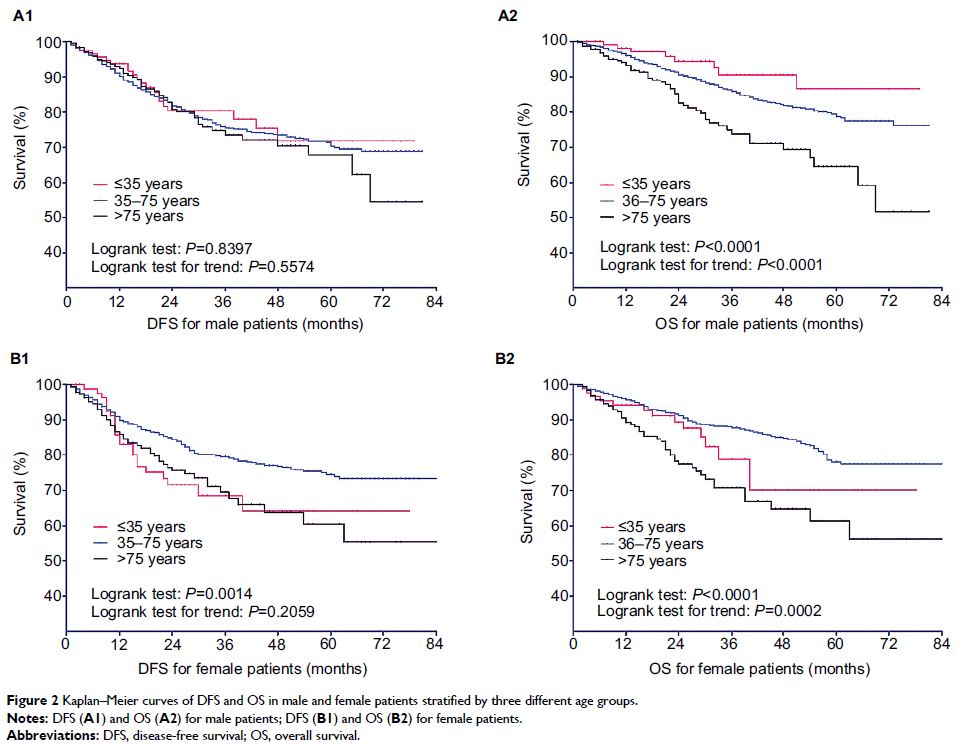108985
论文已发表
注册即可获取德孚的最新动态
IF 收录期刊
- 3.4 Breast Cancer (Dove Med Press)
- 3.2 Clin Epidemiol
- 2.6 Cancer Manag Res
- 2.9 Infect Drug Resist
- 3.7 Clin Interv Aging
- 5.1 Drug Des Dev Ther
- 3.1 Int J Chronic Obstr
- 6.6 Int J Nanomed
- 2.6 Int J Women's Health
- 2.9 Neuropsych Dis Treat
- 2.8 OncoTargets Ther
- 2.0 Patient Prefer Adher
- 2.2 Ther Clin Risk Manag
- 2.5 J Pain Res
- 3.0 Diabet Metab Synd Ob
- 3.2 Psychol Res Behav Ma
- 3.4 Nat Sci Sleep
- 1.8 Pharmgenomics Pers Med
- 2.0 Risk Manag Healthc Policy
- 4.1 J Inflamm Res
- 2.0 Int J Gen Med
- 3.4 J Hepatocell Carcinoma
- 3.0 J Asthma Allergy
- 2.2 Clin Cosmet Investig Dermatol
- 2.4 J Multidiscip Healthc

年轻女性非转移性结直肠癌患者的预后较差:对中国 5,047 名患者进行的医院分析
Authors Shen L, Mo M, Jia L, Jia H, Li Q, Liang L, Shi D, Zhang Z, Cai S, Li X, Zhu J
Received 14 December 2017
Accepted for publication 18 February 2018
Published 4 April 2018 Volume 2018:10 Pages 653—661
DOI https://doi.org/10.2147/CMAR.S159901
Checked for plagiarism Yes
Review by Single-blind
Peer reviewers approved by Dr Colin Mak
Peer reviewer comments 2
Editor who approved publication: Professor Nakshatri
Purpose: To investigate the association of age and sex on survival in
non-metastatic colorectal cancer (CRC) patients and to identify groups at high
risk for poor outcomes.
Materials and methods: We performed a retrospective analysis of 5,047 non-metastatic CRC
patients from 2008 to 2013. Data regarding age at diagnosis; gender; tumor
site; tumor stage; differentiation; lymphatic, neural or vascular invasion; and
survival outcomes were collected. Patients were stratified into 10-year age
groups (≤35, 36–45, 46–55, 56–65, 66–75, >75) and then further analyzed in
three age groups (≤35, 36–75, >75). Disease-free survival (DFS) and overall
survival (OS) were evaluated using univariate and multivariate Cox regression
models.
Results: Of the 5,047 eligible patients, 41.3% were female. The tumor stages were
balanced between the genders. In the female patients, the tumor stages were
similarly distributed among the different age groups, while younger male
patients were diagnosed with more advanced disease (P<0.001
for trend). When stratified into three age groups, young females experienced
significantly poorer survival than young males (DFS: hazard ratio [HR]=1.85
[1.04–3.30], OS: HR=2.65 [1.11–6.34]). After adjusting for tumor stage, site,
differentiated grade and lymphatic or vascular invasion status, females ≤35 and
>75 had shorter DFS than patients between 36 and 75 years old (HR=1.57
[1.03–2.38] and HR=1.51 [1.11–2.05, respectively]), while there was no
difference in DFS between females ≤35 and those >75. For male patients,
older age was associated with poorer OS after the same adjustment.
Conclusion: Young female CRC patients (≤35 years old) had the poorest DFS and quite
poor OS compared to the other age groups. This emphasizes the need for health
care providers to have a heightened awareness and to conduct further research
when caring for young female CRC patients.
Keywords: colorectal cancer, young female, prognosis, China
